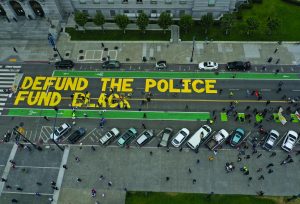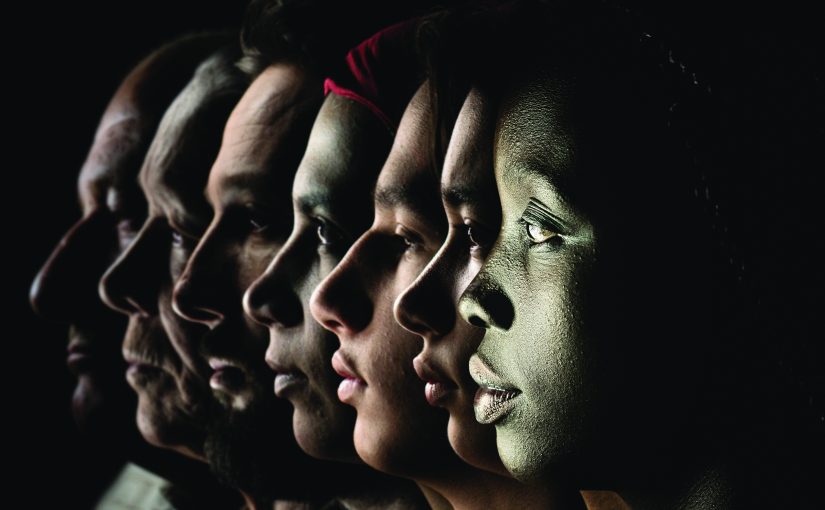Portland, Oregon, is a small U.S. city tucked in between the Pacific Ocean and the mountains in the Willamette Valley, west of the desert. It has a vibrant food culture, artisan coffee shops on every corner, and a community that marches to the beat of its own drum while cheering, “Keep Portland Weird!” Despite Oregon’s reputation as a progressive state filled with people who love outdoor adventure, craft beers, and the local sports teams, our history tells a different story. Oregon was colonized with the expectation that only white people would be allowed to live within its borders.1 The role of law enforcement in this state’s history is complex, and the Portland Police Bureau recognizes the responsibility to build and uphold policies and laws that protect people’s human and civil rights.
The Portland Police Bureau is working to understand the history and build trust to serve the community better. Rather than continue to ignore the disparities in Oregon, the agency is examining the impact of these historical (and ongoing) challenges on the policing profession and removing barriers to effective racial equity and justice.2
One way the police department is approaching this conversation is by engaging in courses that are specifically designed to help law enforcement officers explore the topics of human and civil rights. The National Center for Civil and Human Rights, in collaboration with The Auschwitz Institute for the Prevention of Genocide and Mass Atrocities, offers the Redefining Policing to Affirm and Instill Human Rights (REPAIR) program, which sounded like a perfect fit for these efforts. In February 2021, the department’s equity training specialist, Lauren Rosenstein, registered to take the six-week leadership course to deepen her understanding of the course and see if this was going to be programming that would meet the needs of her organization.
REPAIR Participant Experience
In my experience, online courses can feel lonely, like learning in a void. It takes a lot of time and effort to overcome this inherent challenge and successfully develop an asynchronous program that engages the students both as individuals and as a cohort. REPAIR has created a program that builds engagement within each week’s module to encourage conversations between students in the discussion forums. Even though we were all online and never saw each other in person, I and my classmates had in-depth conversations, challenging each other’s assumptions and supporting each other’s growth mindset. At one point, the course dives into a case study of a woman who was a wife and mother during World War II in Nazi Germany. She had been an average person, and then when the Holocaust began, she too participated in the murder of Jews. The course asked, how can good people do bad things, or are people inherently bad? This is not light material. It is uncomfortable to consider that it is possible that good people, including myself, may do something awful if we truly believed we were “right.” It was challenging for some participants to consider that people who commit crimes are not necessarily “bad.” And, even post-discussion, some people stood firmly in their beliefs that it is only “bad” people who commit crimes. Whatever a person’s view, we were all fully engaged in the question, and we entered the discussion open to hearing each other out, with curiosity and the willingness to change our minds.
As the course progressed, we were asked to look beyond case studies to our own agencies. REPAIR presented information that demonstrated the connections between trauma, implicit bias, and inequitable outcomes. We were then asked to think of ways to reduce harm as law enforcement and build community connections, as well as conceive of tangible ways to implement our ideas. Reading the reflections of other people and their creative solutions allowed me to understand that I’m not alone in this work and showed there are myriad ways to approach a problem. We don’t always have the opportunity to hear from each other in our hierarchal systems, and for six weeks, that barrier did not exist in the coursework, allowing everyone the opportunity to contribute and engage meaningfully. The course drew us in, slowly building our comfort in addressing complex topics around race, trauma, officer wellness, active bystandership, good versus bad, policing in other countries, and more—gently leading us to examine the roots of our profession and encouraging us to find our voice to be change agents and speak up for human rights every day. Our instructor held that space, asked us questions that took us to the next level of thought, and provided extra materials for us. We, as a cohort, could do the work because REPAIR set us up for success.
I completed the course and was thrilled to share it with members of the Portland Police Bureau. My goal is to have every person at the agency, sworn and nonsworn, complete this course. I believe that REPAIR provides the opportunity to dive into case studies and history in a manner that is nonjudgmental and inclusive of all participants, regardless of one’s rank or title, and it connects the historical context to modern-day scenarios. By bringing the two together, we are able to have more open conversations as an agency and provide better service to the public.
The REPAIR Program
The REPAIR program was developed by the Auschwitz Institute for the Prevention of Genocide and Mass Atrocities (AIPG) and its partner organization, the National Center for Civil and Human Rights (NCCHR). AIPG, as an organization, is an international, educational nonprofit with the goal of atrocity prevention at the core of all its programmatic endeavors. AIPG has worked with governments, diplomats, military members, and law enforcement agencies across the globe to assist in training and educating their staff on best practices in prevention.
The program’s materials began as an in-person law enforcement seminar coordinated by the AIPG and the NCCHR. The seminar was attended by all levels of multiple law enforcement agencies in 2017, 2018, and 2019. In 2020, the George Floyd incident and other high-profile police interactions pushed AIPG and NCCHR to rethink their program and its necessity. The beginning of the COVID-19 pandemic forced them, along with the world, to revamp their delivery of educational content and training programs, such as the content within that seminar. This online program’s curriculum was developed from those in-person programs and seminars facilitated by AIPG and then adapted to meet the challenges that 2020 presented. One of the good things that arose from 2020 was that educational and training programming became more accessible through the necessity of remote learning. REPAIR was designed to meet these challenges head-on in everything from the structure to the delivery. From those in-person sessions’ content and the expertise of both AIPG staff and NCCHR, the bones of the existing program were created.

In response to global and national concerns surrounding police reform and, more specifically training reform as it related to the George Floyd incident and others, AIPG and NCCHR strengthened their partnership to develop a program that would be human rights centered and administered to law enforcement professionals across the United States.
Initially, the program was two separate courses, both with asynchronous delivery, taught by AIPG staff. A six-week course for those holding leadership ranks in a department (sergeant level or above) and a two-week course for line officers. However, it was quickly realized by both AIPG staff and within departments where the training was taking place that this model needed to be changed for the most impactful and effective delivery of the materials. The most significant challenge that needed to be addressed was departmental investment. The departments receiving the material had to believe in the course. Without that belief in the program’s benefits, no matter how significant the material might be or how well the AIPG instructors delivered it, there would be a lack of interest and participation. To ensure the best possible outcome, the program was modified to keep the six-week training almost as it was, with an openness to the possibility of amending or rearranging as the program evolved. Then, rather than keeping the two-week course, a “training of trainers” model was implemented. Successful participants identified as trainers in their department can become certified to instruct their department’s non-command personnel in the materials. This certification is attained through a one-day, in-person intensive training with AIPG teaching staff. AIPG comes to the department and then works with the agency to develop the curriculum, which will then be delivered to the organization’s non-command personnel. This means breaking down the topics covered in the leadership course into more digestible bites. Through external research done by AIPG and collaboration with a department, there is a co-creation of the training materials that will be delivered.
An Innovative, Collaborative, and Ongoing Relationship
The first contacts with REPAIR and personnel from the Portland Police Bureau were sparse. Beginning with a small initial cohort, including the co-author of this article, Lauren Rosenstein, the first brushes with the program were enthusiastic but not fully formed. However, Lauren knew this program would work and was necessary for the bureau to complete. As the program officer for REPAIR at AIPG, Jenna Fagan is responsible for ensuring that partnering departments are just that—partners.
“The Portland Police Bureau is working to understand the history and build trust to serve the community better. ”
This sets REPAIR apart from other training programs that may cover similar, though never the same, topics. First, utilizing both virtual and in-person training components allows for addressing different learning styles and recognizes the differences between leadership and non-leadership training needs. A second difference is the approach to changing departmental culture utilizing a mid-level leadership/command staff model versus a top-down or bottom-up approach. Rather than starting with a top-down or bottom-up, the programs with those in the ranks of sergeant, lieutenant, or captain. AIPG believes this most effectively promotes change within the department and gives the material to those who can most effectively disseminate crucial training information. Then, with the “training of trainers” component, the program assists departments to build capacity within their teaching staff. Finally, while the program is designed to meet certain training needs of a department, AIPG wants not only to learn how to better meet those needs but also to see if it can assist departments in meeting other needs or concerns. For example, a department that recently signed on explained that they were currently facing an explosion in their population of persons experiencing homelessness. While AIPG knew it could not expressly help them address their need for resources or solutions, the program staff were confident that another department they had worked with previously would be able to assist with this challenge. This is a tremendous benefit of a relationship with AIPG that goes beyond the actual training itself. A core component of the collaborative relationship is that, by becoming partners with AIPG, departments have access to a vast alumni network and resources. One of the initiatives in the works, as more departments enter these collaborative relationships with AIPG, is an alumni newsletter exclusively for the program’s law enforcement alumni. The ideal outcome for this newsletter would be an opportunity to collaborate with other departments on how they implement this training and the chance to problem-solve issues facing other departments.
Tangible, structural change in order to solve the complex issues of modern law enforcement is best achieved through concerted efforts in collaboration. AIPG is hopeful that the partnership model of training it is developing with the Portland Police Bureau will be the future of police departments’ training with outside agencies. d
Notes:
1Walidah Imarisha, “A Hidden History: The Stories and Struggles of Oregon’s African American Communities,” Oregon Humanities Magazine (Summer 2013).
2Robert A. Brown, “Policing In American History,” Du Bois Review: Social Science Research on Race 16, no. 1 (Spring 2019): 189–195.
Please cite as
Jenna Fagan and Lauren Rosenstein, “The Future of Specialized Training with Outside Agencies: Portland Police Bureau and the REPAIR Program,” Police Chief Online, February 22, 2023.



